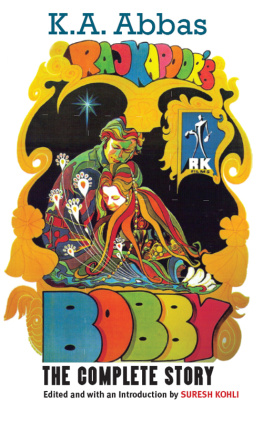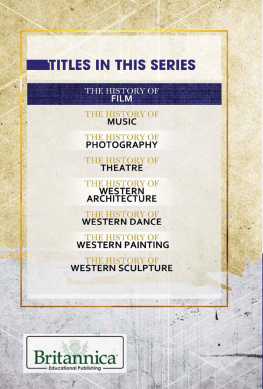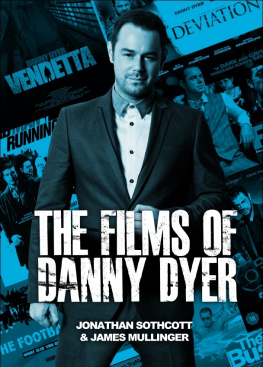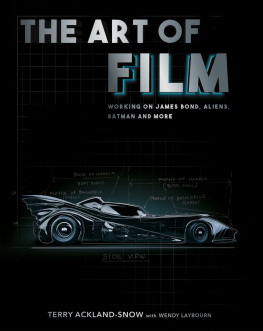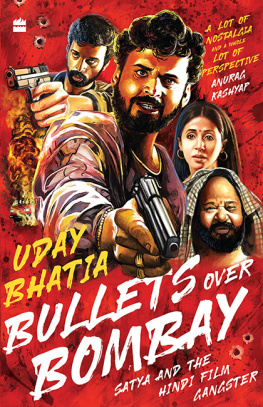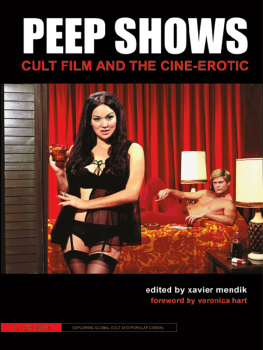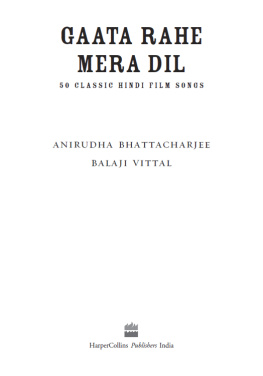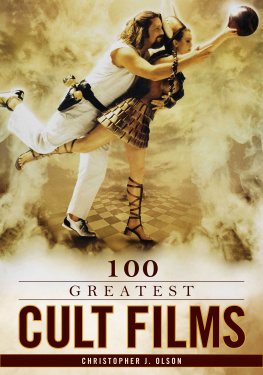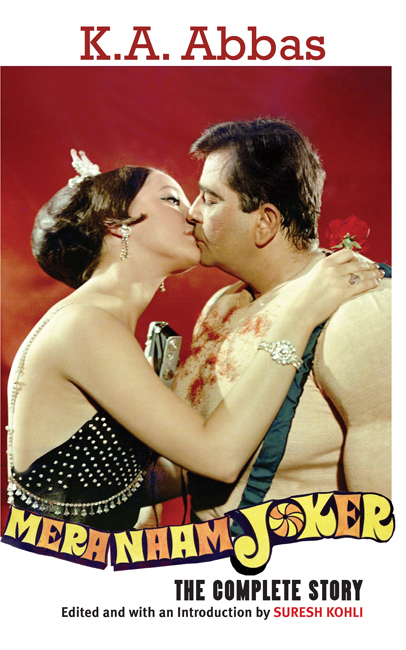
MERA NAAM JOKER
The Complete Story
KHWAJA AHMAD ABBAS
Edited and with an Introduction by
SURESH KOHLI

HarperCollins Publishers India
To
The Joker who lives within the heart of Raj Kapoor
Contents
The idea of Mera Naam Joker first struck Raj Kapoor after he watched a Czechoslovakia State Circus show in Bombay on an early February night in 1960. The very next day, he approached his favourite scriptwriter, Khwaja Ahmad Abbas. In Raj Kapoors own words: It is the story of a tear and a smile. It is the story of a character, the joker, who says, I shall drink your tears and in return make you smile. The statement was duly reproduced in the trade broadsheet Screen issue of 10 February.
The film released exactly a decade later (8 December 1970), seven years after the monumental hit, Sangam (in which Raj Kapoor had already begun to show signs of wear and tear). By now, Raj Kapoor the actor, though barely forty-six years old, had lost both shape and looks, and was clearly no longer acceptable as a hero. Mera Naam Joker was nearly five years in the making, and had Rajendra Kumar, Dharmendra, Manoj Kumar, Dara Singh and Simi Garewal in supporting roles, and a plump Padmini as the heroine. Though an unmitigated box-office disaster, it managed five Filmfare trophies: Best Director (Raj Kapoor), Best Music (ShankarJaikishan), Best Cinematography (Radhu Karmakar), Best Sound Recordist (Allauddin) and Best Playback Singer (Manna Dey).
According to the grapevine, the original script had six segments, each with a different leading lady, and was proposed as two different films, each consisting of three chapters or sections. Though there seem to have been second thoughts, it does appear plausible, and looking at the speed and manner in which the film begins, it probably began that way. Manoj Kumars name as a co-scriptwriter in the credit titles justifies his claim of rewriting the first part with the young joker. This was on the night of 24 October 1961before Raj Kapoor began Sangam.
In the Screen issue of 4 December 1970, the main writer, Khwaja Ahmad Abbas was quoted as saying: I remember the occasion very well when, accompanied by friend and collaborator V.P. Sathe, with whom I like to discuss most of my screenplays, I took the finished script to Raj Kapoor. It was characteristic of him that he cancelled all appointments, gave strict instructions to the studio telephone operator that he was not to be disturbed. He had a bath, changed, burned incense before the various gods (and goddesses?) installed in his cottage, and only then he sat down to take in his hands the fat volume I presented to him. Raj respects his writers, and he respects their scripts, and he also takes pains to make this evident.
The first script of Awara had been written like a short story. The script of Shree 420 was written like a novella, or a long short story. But when it came to Mera Naam Joker, I gave him a leather-bound, two hundred-page-long tome. Perhaps he dramatized a little, for instance, when he placed the bound volume on his head, as if it was a scripture, but I think for the moment he was entirely sincere. He has said it again and again that the script is a holy book for him, for it is the source of all his inspiration.
It was his most ambitious venture and, technically, the countrys most perfect film until then. And it was special as it was also supposedly autobiographical. But a lot went wrong during the making. According to his friend, publicist and producer, the late Bunny Reuben: During the course of the nine years it took Raj Kapoor to make Mera Naam Jokerof which full five years, 196570, were spent in actual productionthe script got revised several times. New situations were added, earlier ones condensed, and dialogue was written, rewritten and again written to suit the innumerable stars as and when they were ready to enter the footage of this three-in-one blockbuster.
In Raj Kapoor: The Fabulous Showman, grandiosely subtitled An Intimate Biography, quoting Abbas, Reuben elaborates: When we went to Rajs farm at Loni, near Poona, to revise the First Chapter introducing the young Raju (played by Chintu), Raj had a number of recollections of his own schooldays which he wanted incorporated in the scenes. We had planned a ten-day working schedule. After the first evenings session when Raj talked nostalgically about his boyhood experiences, I knew exactly what he wanted. When two people have been working together over a period of years and have acquired a regard for each others capabilities, and have come to understand each others viewpoints, a sixth sense begins to operate between them. Th en work is no longer drudgery, changes are not irksome, suggestions are welcomed, even anticipated, and met halfway. A kind of telepathy informs one what the other wants.
The scenes were recast and rewritten, entirely to his satisfaction, in just three days, and we came back a week before we were expected in Bombay Raj Kapoor has the reputation of being the Great Lover, but few people realize that his one great, abiding and permanent love is film-making to which he will, and he does, subordinate everything else in the world. The time, the attention, the concern, that other people lavish on their families, children and friends, Raj Kapoor bestows on his films. Like all lovers, he is alternately nervous and overconfident, generous and jealous, large-hearted and possessive, overpowering and cringing, gentle and sadistic. Creation is a lonely process and very few people know how many lonely hours Raj Kapoor spends locked in his cottage, worrying how his beloved, the film, is shaping up.
While no great ideologue, Raj Kapoor is not allergic to ideas. Indeed, with his basic sympathy for the cause of the common man, he is more amenable to socially progressive ideas and humanist ideals, so long as their presentation does not interfere with the popularity potential of his film uncanny mastery over the box office, the intuitive grasp of what will appeal to the public, his subtle way of weaving in music as an integral part of the narrative, his almost unequalled ability to purvey popular entertainment without pandering to the popular bad taste. It makes himand his filmsa uniquely powerful and potent medium for the transmission of ideas.
But, in retrospect, this very overconfidence, this overindulgence determined the fall of Mera Naam Joker and, after a brief hiatus in the form of Bobby, returned in another disaster, Satyam Shivam Sundram. Coming back to Joker, the unchecked enthusiasm, the overindulgence resulted in the three chapters eventually becoming three full-length feature films. Abbas feared this would happen because Raj Kapoor made sure he was on hand for every shooting schedule, and was even made to direct a part of the circus procession sequence that was canned on the streets of Mumbai, attracting a huge multitude.
In Raj Kapoor Speaks (Penguin Viking, 2002), drawing from different sources, daughter Ritu Nanda quotes her father with regard to his association with Abbas and the making of the magnum opus: Has anybody seen my heart ? This scene from Mera Naam Joker, at the very beginning of the film, affects me deeply. The performer, the Joker, has invited all his past attachments, all those he has been emotionally involved with. He is giving his last performance because he has a premonition that he is going to die
I feel that we (artists) are the fortunate few in this world who have had the boon of people looking into our hearts of having loved them, and receiving love in return. This affects me tremendously.
Next page

